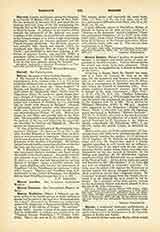

Marcellus of Ancyra, one of the bishops present at the Councils of Ancyra and of Nicaea, a strong opponent of Arianism, but in his zeal to combat Arius adopting the opposite extreme of modified Sabellianism and being several times condemned, dying deprived of his see c. A. D 374. A few years after the Council of Nicaea Marcellus wrote a book against Asterius, a prominent Arian. In this work he maintained that the trinity of persons in the Godhead was but a transitory dispensation. God was originally only One Personality, but at the creation of the universe the Word or Logos went out from the Father and was God‘s Activity in the world. This Logos became incarnate in Christ and was thus constituted Son of God. The Holy Ghost likewise went forth as third Divine Personality from the Father and from Christ according to St. John, xx, 22. At the consummation of all things, however (I Cor., xv, 28), Christ and the Holy Ghost will return to the Father and the Godhead be again an absolute Unity. The bishops at Jerusalem having condemned his works, Marcellus was first deposed at Constantinople in 336 at a council under the presidency of Eusebius of Nicomedia, the Arian, and Basil of Ancyra appointed to his see. Marcellus sought redress at Rome from Julius I, who in the autumn of 340 declared Marcellus innocent of the charges brought against him, and reinstated him in his see. Constantius, when threatened by his brother, allowed the restoration of Athanasius, Marcellus and others to their sees in 348. Marcellus’ return was resisted by the populace of Ancyra, but he succeeded in occupying his see for a few years, only to be finally deposed by the Macedonian faction at Constantinople and succeeded by Basil, c. 353. St. Athanasius himself at last recognized Marcellus’ heterodoxy; Pope Damasus likewise, in 380, and the Second General Council pronounced against him. Eusebius of Caesarea wrote against him two works: “Contra Marcellum”, an exposition of Marcellus’ doctrine, and “On the Theology of the Church,” a refutation of Marcellus.
J. P. ARENDZEN

